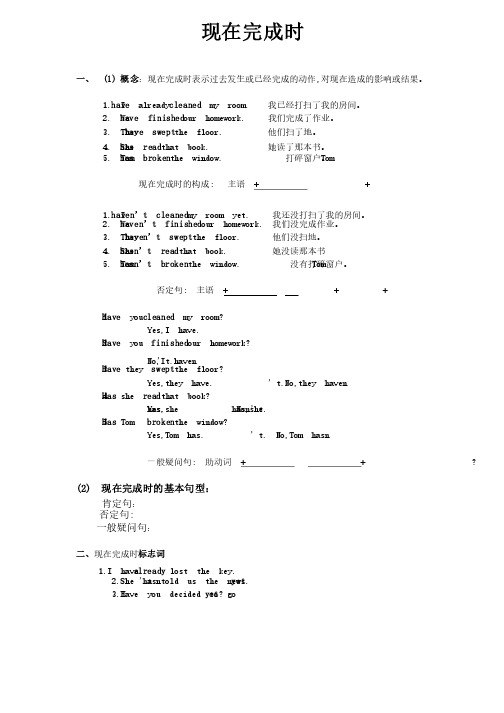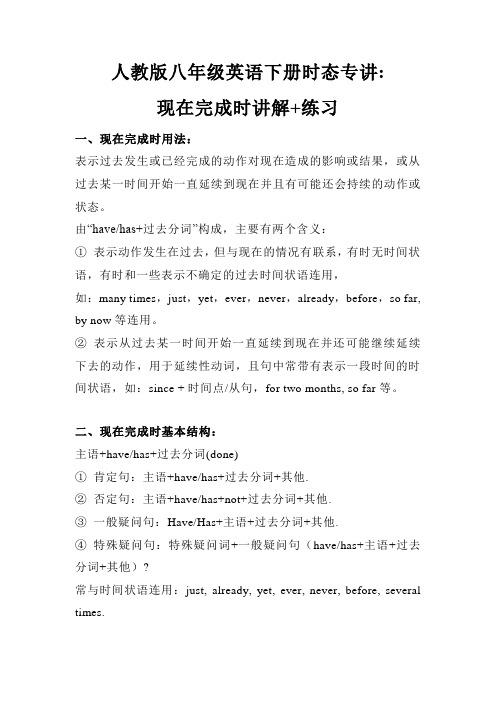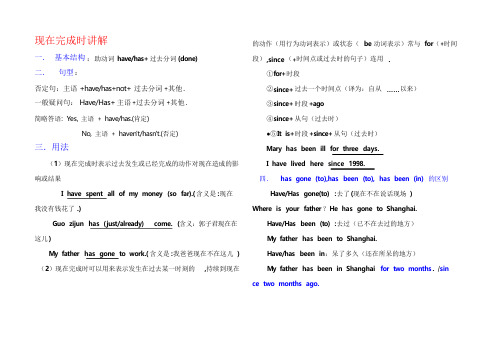(完整版)初中英语人教版八年级下册现在完成时
英语人教版八年级下册现在完成时讲解

都用How long
.区分短暂性动词与持续性动词. 表示短暂性(瞬间性)的动词在现在完成时 的句中不能和一段时间连用.即for,since短 语或how long问句
常见非延续性动词和延续性动词的转变
非延续性动词 arrive/come/go to leave/ move become a join start/begin open close go to sleep 延续性动词 be in be away / be out be a be in/ be a member of be on be open be closed be asleep睡着了 sleep睡着了
I have lived here for 11 years. I have lived here since 2000/ 11 years ago. She has learn ed English for 5 years. 她学英语 5年了。 She has learned English since 2007. have/has /+since v过去分词 动词构成: 5 years ago.
• 2.不规则动词
Eg.
go—went—gone see---saw—seen forget—forgot—forgotten run—ran ---- run
现在完成时
1.过去发生的动作对现在造成的影响 或结果。 I’m not hungry now had breakfast
paห้องสมุดไป่ตู้t
now
我已经吃过早饭了。
把下列句子变成否定句。 I have just cleaned my clothes. not He has just had his breakfast. not
英语人教版八年级下册现在完成时构成及用法

现在完成时(Present Perfect Tense )1.现在完成时的构成现在完成时由“助动词have ( has)+过去分词”构成。
下面以动词finish 为例,例如:I haven’t bought anything for two months.3.现在完成时和一般过去时的区别现在完成时表示过去发生的某一动作对现在造成的影响或结果,强调的是现在的情况,所以它不能和表示过去的时间状语连用,例如:yesterday, last night, three weeks ago, in 1990等。
而一般过去时只表示过去的动作或状态,和现在不发生联系,它可以和上述表示过去的时间状语连用。
例如:I have seen the film.我看过这部电影。
(我了解这部电影的内容。
)I saw the film last week.我上个星期看了这部电影。
(只说明上星期看了这部电影,不涉及现在的情况。
)He has lived here since 1992. 1992年以来他一直住在这里。
(他现在还住在这里)He lived here in 1992. 1992年他住在这里。
(不涉及他现在是否还住在这里。
)练习一。
选择1.—_________you ______ him before ?—No,not yet。
A.Have ; metB. Did ;meetC. Do; meetD. Were ; meeting2.—Let’s go shopping ,Lily ! Have you finished your homework _______?—No, not _______.A. just; yetB. ever ; alreadyC. yet; yetD. ever; just3.—Lily ,why are you still here ? School is over for half an hour.—Because I ______ my task yet. I still need one more hourA. won’t finishB. don’t finishC. haven’t finishedD. hadn’t finished4.—I’d like to introduce my best friend to you ,Peter.—Thank you, Lucy. But we ______ already.A. meet B .met C. will meet D. have met5.—Have you finished your work _____?—Yes, I have. I’ve ________ finished it .A. yet; alreadyB. already ; yetC. already; alreadyD. yet ; yet6.—Have you found your IPod?—_____________.A. No, you haveB. Not yetC. Yes, I doD. Yes, I found7.Lucy’s never been to Beijing , _______ she ?A. isB. isn’tC. hasD. hasn’t8.Mary ______ yet. I’m waiting for her .A.. came back B .has come back C. hasn’t come back D. was com ing back9.—_________ you ______ out the problem, Sam?—Not yet, but I’m going to .A. Did; workB. Are; workingC. Have; workedD. Will; work10.—_______you _______ a pen on the desk ?—Yes, but Miss Liu ______it away just now.A. Have; seen; has taken B .Have; seen ;took C. Have; see; took D. Do ; see; has taken11.—Have you cooked supper ________?—Yes, I have ________ finished it .A. yet ; justB. yet; everC. already; yetD. already ;just12.Mr.Wnag isn’t here ,I think he _____ Shanghai.A. went B has been to C. has gone to13.—Hello! Could I speak to Lily/—Sorry ,she is not in .She ________ Shanghai.A. have been toB. have gone toC. has been toD. has gone to14.Neither my sister nor I ______ been to America before.A. have everB. have neverC. has everD. has never15.He _______ to Beijing many times.A. have been B . has been C. have gone D. has gone16.—Have you ever left your keys in your house?— No, _________.A. ever B . already C. yet D. never17.Mr.Green _______ China for ten years.A. has been to B .has been in C. has come to D . has gone to18.—He ________ the English –Chinese dictionary for about ten years ,but it is still new .— What a careful man!A. has boughtB. has borrowedC. has hadD. bought19.In the last ten years changes _________ place in my hometown.A. took B . had taken C. have taken D. take20.Zhao Lan ______ already ______ in this school for two years.A. was ;studyingB. will ; studyC. has ; studiedD. are; studying21.Hurry up ! The play ______ for ten minutes.A. has begunB. had begunC. has been onD. begun22.—How long have you _____ China?—For three years .A. come backB. returnedC. leftD. been away from23.—Oh, Mrs. King, your necklace looks nice. Is it new?—No ,I _______ it for two years.A. hadB. have hadC. boughtD. have bought24.—You are leaving your school .How do you like it?—Very much, of course .I _____this school since I moved here .A. have gone toB. came toC. have been toD. have been at25.—I’m sorry to keep you waiting for a long time.—Oh, not at all. I ______ here for only a few minutes.A. have arrived B have been C. arrived D was26.—Hello, this is Lily speaking. Could I speak to Mr. Black?—Sorry. He _____ Beijing .A. has been to B . has gone to C. has been in D. will go to27.H e ________ in this factory for 20 years already.A. will workB. worksC. has worked D is working28.—I wonder when you ______ the new watch.—Well, I ____ it for two weeks.A. have bought; have hadB. bought; have boughtC. bought; have hadD. have bought; have bought29.The Browns________ Water World twice.A. went toB. has been toC. have been to D . have been in30.Tom ____ Mary in 1998.That is to say ,they _____ for 15 years.A .got married with; have got married B. got married to ; have marriedC. married; have been marriedD. married to ; have been married31.—I’m sorry .I ______ your printer for such a long time .—Never mind.A. have borrowedB. have lentC. have keptD. have bought32.—What a nice bike ! How long _____you ________ it ?—Just two weeks .A. have ;boughtB. did ; buyC. have ; hadD. are; having33.—__________you ever_______ Chinese moon-cakes, Diana?—No, never .But I have had noodles.A. Do; tryB. Will; tryC. Did ;tryD. Have ; tried34.—________ has your brother studied in New York?—For two years.A. How farB. How oldC. How oftenD. How long35.—When ______ your mother _____ you that blue dress,Mary?—Sorry ,I really can’t remember.A. does; buyB. has; boughtC. had; boughtD. did ; buy36.—_________ has your uncle been to Canada ?—Only twice .A. How many timesB. How oftenC.How longD.How far37.—How beautiful your skirt is! Is it new?—No,I have ________ it for two months.A. borrowedB. boughtC. had D got38.—How long have you collected shells?—__________.A. After I left schoolB. Before I moved hereC. When I went to the beachD. Since I was ten years old39.—What are you going to do this weekend ?—I _________ yet.A. haven’t decideB. won’t decideC. have decidedD. didn’t decide40.Great changes _______ in our city since 1980.A. took placeB. have taken placeC. happenedD. have happened41.—I have never been to American Computer Museum .What about you ?—________ .A. So do IB. So have IC. Neither do ID. Neither have I42.He _______ the house ,and you can put your things in it .A. cleaningB. cleaning outC. cleaned D . has cleaned out43.Tom has never ______Australia. But his parents have ______ theretwice.A. been to ; been to B . been ; gone C. been to ; been D. gone ;gone二。
英语人教版八年级下册现在完成时

(三)一般疑问式
助动词Have /Has +主语+过去分词+其它 1)——Have you ever made dumplings ?你曾经做过饺 子吗? ——Yes ,I have .是的,我做过。 2)——Has she ever been abroad ?她曾经出过国吗? ——No,never.不,从来没有。 3)——Have they found the lost books yet ?他们已经 找到了丢失的书吗? ——Yes ,they have.是的,他们找到了。
5.never意为从来没有常与before连用(before) 要放在句尾,而never多放在助动词与过去 分词之间。eg:
I have never travelled by plane before. 我以前从来没有乘飞机旅行过。
6.before意为以前,指过去不确定的某个时 间,总是放在句末,不受句型的限制。eg:
1.already意为已经,通常用于肯定句中,可 放在助动词之后,过去分词之前,也可以放 在句末。实例:
1)I’ve already read this book. 我已经读过这本书了。 2)I’ve washed my clothes already.我已经洗了衣服。 3)Have you met him already ?你(真的)已经见过他了?
现在完成时
一、现在完成时的基本结构 (一)肯定式 主语+助动词have /has +过去分词+其它
1)Ive just copied all the new words .我刚抄写了所 有的生词。 2)She has lost her books .她丢失了她的书。 3)We’ve just cleaned the classroom .我们刚好打 扫了教室。
初中英语人教版八年级下册现在完成时

请大家认真分析比较下列各例句:
I saw this film yesterday. (只说明动作发生在过去。) I have seen this film. (强调对现在的影响,电影的内容已经知 道了。) She has returned from Paris. (她已从巴黎回来了。) She returned yesterday. (她是昨天回来的。) He has been in the League for three years. (在团内的状态可延续) He joined the League three years ago. ( 三年前入团,joined为 短暂行为。)
3)H4.e时ha间s r状etu语rned the book. (对划线部分提问)
4)Jenny has had her lunch for three days.
(改为一般疑问句并做否定回答)
1.现在完成时的构成
2.一般疑问句及否定句的 结构
疑问式:
Have/Has + 主语 + 动词过去分词
1.现在完成时的构成
2.一般疑问句及否定句的 结构
3.现在完成时的用法
4. 时间状语
1)过去发生或已经完成的某一动作对 现在造成的影响或结果。
2)现在完成时表示从过去一直持续到 现在的动作或状态。
She has learned English for 5 years. He has lived in Beijing since ( 自从)he was born . Have you stayed here since ( 自 从) 3 o’clock?
Unit 9 现在完成时-八年级英语下册(人教版)

2.Me, too. = So have I. Me, neither.= Neither have I.
现在完成时
现在完成时可表示过去发生或已经完成的动作对现在造 成的影响或结果。 e.g. I have lost my pen. (我现在无钢笔可用)
—Sorry, he isn’t in. He __h_a_s_g_o_n_e__to___ the school library. 2) —Are you looking forward to going to Paris?
—No. I __h_a_v_e__b_e_e_n_t_o__ the city twice. 3) —Are you interested in going to the Palace Museum?
He __h_a_s_n_'t_ __ea_t_e_n__ all the food on the plate ___y_et___. 3) —Has Peter driven a car before? (作肯定回答)
—__Y__es___, ___h_e___ ___h_a_s__. 4) —Mary, have you got a job yet? (作否定回答)
考点三:一些短暂性动词转换成意义相近的延续性动词或 be+形容词 / 副词 / 介词短语 / a(n)+名词,与表示 一段时间的状语连用。如:buy → have borrow → keep move → live die → be dead open → be open close → be closed fall asleep → be asleep marry → be married leave → be away come → be in / at begin / start (电影等开始) → be on join → be in +组织 / be a member in +组织
人教版八年级英语下册现在完成时

2. 辨析:for & since 的用法(表示动作或状态的持续)
标志词
含义
for + 时间段短语
“持续了…时间”
since + 时间点从句
“自从…”
【总结】 • 提问用how long,回答时两者一般放在句末,since可以放在句首 • 该时态与for/since连用表示动作或状态的持续时,使用延续性动词 • 若since引导从句,从句使用一般过去时
【练习3】选出正确选项。 ( B ) 1. Mathew_______ already _______ in Stone Town since 1998.
A. have, lived
B. has, lived
C. have, live
D. has, living
( C ) 2. We have been good friends since they ______ to China.
have been away from
have, lived
B.
came
D.
• ever 【adv.曾经】 _____________________________________
• never 【adv.不曾】
他刚来到。 He has just come. 我已经把邮件发送出去了。 I have already sent the email. Betty曾经到过上海。 Betty has ever been to Shanghai. 她不曾看过这部电影。 She has never seen this film.
3. 延续性动词 & 非延续性动词
【非延续性动词转化成延续性动词】 • 实质:瞬间行动作 → 状态
英语人教版八年级下册现在完成时

现在完成时一、 (1) 概念:现在完成时表示过去发生或已经完成的动作:现在完成时表示过去发生或已经完成的动作,,对现在造成的影响或结果。
对现在造成的影响或结果。
1. I have already c leaned cleaned my room. 我已经打扫了我的房间。
我已经打扫了我的房间。
2. We have finished our homework. 我们完成了作业。
我们完成了作业。
3. They have swept the floor. 他们扫了地。
他们扫了地。
4. She has read t hat book. that book. 她读了那本书。
她读了那本书。
5. Tom has broken the window. Tom 打碎窗户。
打碎窗户。
现在完成时的构成现在完成时的构成: : 主语主语 + + + +1. I haven haven’’t cleaned my room yet. 我还没打扫了我的房间。
我还没打扫了我的房间。
2. We haven haven’’t finished our homework. 我们没完成作业。
我们没完成作业。
3. They haven haven’’t swept t he floor. the floor. 他们没扫地。
他们没扫地。
4. She hasn hasn’’t read t hat book. that book. 她没读那本书她没读那本书5. Tom hasn hasn’’t broken t he window. Tom the window. Tom 没有打碎窗户。
没有打碎窗户。
否定句否定句: : 主语主语主语 + + + + + +1. Have you c leaned cleaned my room?Yes,I have.2. Have y ou you finishedour homework? No,I haven ’t. 3. Have they swept t he floor?the floor? Yes,they have. No,they haven ’t.4. Has she read t hat book?that book? Yes,she has. No,she hasn hasn’’t.5. Has Tom broken t he window?the window? Yes,Tom has. No,Tom hasn ’t.一般疑问句一般疑问句: : 助动词助动词助动词 + + ? + + ?(2) 现在完成时的基本句型:肯定句:肯定句:否定句否定句: : 一般疑问句:一般疑问句:二、现在完成时标志词1.I have already lost the key.2.She hasn ’t told us the news yet .3.Have you decided to go yet ?4.I have just cleaned my hands.5.John has never been to Nanjing6.Have you ever been to a museum?7.He has stayed here since 5 5 o o ’clock.David has lived here since 1992.8.He has has stayed stayed stayed here here since 5 5 hours hours hours ago. ago.His father has been in the Party since 10 years ago.9.She has taught English since he he came came came here. here.She has taught us since I came to this school.10.He has kept the book for 2 weeks.I have had this dictionary for t hree years.three years. Since: (自…以来)(1)(2)(3)for(长达)just (谓语动词之前谓语动词之前谓语动词之前) before() before(句末)句末) so far so far 到目前为止到目前为止in the past/last few years(过去几年来过去几年来) )练一练:练一练:选用选用 for for 和 since 填空填空: :1.We haven ’t seen each other ______ a long time.2.His father has been in the Party ______ 10 years ago.3.The film has been on ______ 20 minutes.4.Mr Green has worked here ______ he came to China.5.His grandparents have been dead ______ several years.6. It ’s five years _______ we met last time.1.The house is dirty. We _______it for weeks.A didn ’t cleanB hadn ’t cleanedC don ’t cleanD haven ’t cleaned2. ---Have you found your keys _______---Yes, I have _______ found them.A already; yetB yet;alreadyC already;alreadyD yet;yet3.3. -- I ’m sorry to keep you waiting.--Oh, not at all. I _____here only a few minutes.A have beenB had beenC wasD will be4.4. You don ’t need to describe her. I _______ her several times. A. had met B have met C met D meet5. --Will you go to Beijing for vacation ?--I _______ to go , but I don ’t know if I can go .A was planningB have plannedC had been planningD have been planning planning6. --When will they leave ?--They ______very soon .A do leaveB are leavingC have leftD leave7 --Was he studying for an exam ?--Yes , he's ____ it last week.A doingB to takeC makingD to give8.The teacher told the pupils that the earth ____ round.A isB wouldC wasD were9.9. She _______ such an interesting book before.A was never readingB will never readC had never readD has never rea10.10. How long do you think the meeting ______A is lastingB is lastedC will lastD lasts11. 11. I ____________(wait) for him for two hours . I am very angry . I ____________(wait) for him for two hours . I am very angry .12. 12. He _________ (be) a doctor since he was twenty .13. 13. The film __________ (be) on for fifteen minutes .14. 14. ____ you ever ____ (read) that book before ?15. 15. ____ you ever ____ (try) to change her ?16. 16. No one ____________ (arrive) here yet . No one ____________ (arrive) here yet .17. 17. ______ the bus _____ (leave) yet ?18. 18. I____ I____ I____ already already already ______ ______ ______ (see) (see) (see) the the the film. film. film.19. 19. My My My father father father ____ ____ ____ just just just _____ _____ _____ (come) (come) (come) back back back from from from work. work.20. 20. I I I _____________ _____________ _____________ (work) (work) (work) here here here since since since I I I ______ ______ ______ (move) (move) (move) here here here in in in 1999. 1999. 21. 21. So So So far far far I I I _______________(make) _______________(make) _______________(make) quite quite quite a a a few few few friends friends friends here. here.22. 22. -How -How -How long long long _______ _______ _______ the the the Wangs Wangs Wangs _______(stay) _______(stay) _______(stay) here? -For here? -For two two weeks. weeks. weeks.23. 23. I I I ________ ________ ________ just just just ___________ ___________ ___________ (finish) (finish) (finish) my my my homework. homework. homework.24.______ 24.______ you you you ______ ______ ______ (find) (find) (find) your your your science science science book book book yet? yet?一般过去时与现在完成时之比较1)一般过去时表示过去某时发生的动作或单纯叙述过去的事情,强调动作,和现在不发生关系。
现在完成时课件2022-2023学年人教版八年级英语下册

•3.have / has / had (区分助V?实V?)
倒装
• So + be / 助 V / 情V + 主语2. 某人/某物也....
• Linda likes this novel, _s_o_d__o__I___ (我也一样) _so__d__o_e_s_h__e (他也一样)
He did homework yesterday. • 3.现在进行时 (am/is/are + V-ing)
He is doing homework now. • 4.过去进行时 (was/were + V-ing)
He was doing homework at 8 pm yeaterday. • 5.一般将来时 (will + V原 am/is/are + V-ing)
现在完成时
非常重要,请竖着耳朵听 学习之前请复习.........
•实义动词 •系动词 •情态动词 •助动词
walk run talk see
be(am is are was were ) 部分系V: smell sound taste feel
can could should must may might will would
(谓语)
主语 + have / has + V-pp + 宾语 + 其他.
主三单→ has 主复→__h_av_e__
V-pp构成 (pt) + ed/ e+d/ y-ied/ 双+ed
不规则中找规律
• 1.过去式 = 过去分词 = 原形 • 2.过去式改字母 过去分词 = 原形 • 3.过去式改字母 过去分词 = 原形 + en • 4.过去式改字母 过去分词 = 过去式 + en • 5.原形ow → 过去式ew → 过去分词 = 原形+ n • 6.原形i → 过去式 a →过去分词 u • 7.原形 → 过去式ought → 过去分词ought • 8.原形 → 过去式aught → 过去分词 aught • 9.过去式改元音字母 过去式 = 过去分词 • 10.过去式改辅音字母 过去分词 = 过去式 • 11.过去式改字母+t 过去分词 = 过去式
人教版八年级英语下册时态专讲-现在完成时讲解+练习

人教版八年级英语下册时态专讲:现在完成时讲解+练习一、现在完成时用法:表示过去发生或已经完成的动作对现在造成的影响或结果,或从过去某一时间开始一直延续到现在并且有可能还会持续的动作或状态。
由“have/has+过去分词”构成,主要有两个含义:①表示动作发生在过去,但与现在的情况有联系,有时无时间状语,有时和一些表示不确定的过去时间状语连用,如:many times,just,yet,ever,never,already,before,so far, by now等连用。
②表示从过去某一时间开始一直延续到现在并还可能继续延续下去的动作,用于延续性动词,且句中常带有表示一段时间的时间状语,如:since + 时间点/从句,for two months, so far等。
二、现在完成时基本结构:主语+have/has+过去分词(done)①肯定句:主语+have/has+过去分词+其他.②否定句:主语+have/has+not+过去分词+其他.③一般疑问句:Have/Has+主语+过去分词+其他.④特殊疑问句:特殊疑问词+一般疑问句(have/has+主语+过去分词+其他)?常与时间状语连用:just, already, yet, ever, never, before, several times.Already: “已经”; yet“仍然, 还”,这两个副词常常用于完成时态, 其中already常用于肯定句, yet常用于否定句和疑问句中。
如: Jim has already finished his work. Jim已经把他的工作做完了。
Mother hasn’t come home yet. 妈妈还没回来。
三、现在完成时一般过去时的区别:现在完成时表示的是与现在有关联的过去事件;而一般过去时则与现在毫无关系,只是单纯的过去的情况。
比较:I have lost my pen, so I have to buy one.我丢了钢笔,所以得去买一枝。
人教版新目标初中八年级下册现在完成时态

05
现在完成时态常见错误及纠正方 法
主谓不一致错误
错误示例
They have done their homeworks.
纠正方法
将have改为have done,homeworks改为homework。正确的句子应该是:They have done their homework.
时态混淆错误
错误示例
so far
表示到目前为止,如 "So far, we have learned about 500 words."(到目前为止,我们 已经学了大约500个单词。)
时间状语在句子中位置
一般位于句首或句尾,用逗号与句子其他部分隔开,如 "For the past week, I have been busy with my homework."(过去的一周里,我一直忙于作业。)
用于肯定句中,表示“刚 刚”。例如:I have just finished my homework.
用于疑问句和否定句中, 表示“曾经”。例如: Have you ever been to Beijing? / I have never been to Beijing.
用于表示动作持续的时间 或起始时间。例如:I have lived here for ten years. / I have lived here since 2010.
I have went to the park yesterday.
纠正方法
将have went改为went。正确的句子 应该是:I went to the park yesterday.
漏用或误用助动词have/has
错误示例
He eaten an apple.
英语人教版八年级下册现在完成时PPT课件

► 表示
►2
表示继续的现在完成时 ► 肯定句: Li Ming’s elder brother has studied in Peking University for five years. ► 否定句: We haven’t seen each other all this month. ► 疑问句: ► A: How long have you known your boy friend? ► B: I have known him since he came here six months ago
► We’ve
always/ often seen him jog in the morning. ► 我们经常看到他晨跑 ► Nancy hasn’t gone to school recently/lately. ► 南希最近/近来没有去上学. ► Three students have been rescued so far . ► 截止到目前,已有三句学生获救. ► We have learned about 2,000 words
► My
father has just gone out. ► 我的父亲刚刚出去了。 ► I have closed the window. ► 我把窗户关上了。 ► Mr. Li has gone to Australia. ► 李先生去澳大利亚了。 ► 表示“完成”、“结果”的现在完成时是 表示在过去发生并结束的动作对现在产生 的结果和影响。这种用法可分为下面两种 情况:
► 主语+have/has+not+过去分词
► 例:The
concert hasn't /has not started yet. ► 音乐会还没有开始. ► 例:They haven't/have not gotten to London yet.他们还没有到达伦敦. ► 例:I haven't graduated from the university yet. 我还没有完成我的大学学 业呢.
人教版八年级英语下册现在完成时讲解及练习

现在完成时讲解一.基本结构:助动词have/has+过去分词(done)二.句型:否定句:主语+have/has+not+过去分词+其他.一般疑问句:Have/Has+主语+过去分词+其他.简略答语:Yes,主语+have/has.(肯定)No,主语+haven't/hasn't.(否定)三.用法(1)现在完成时表示过去发生或已经完成的动作对现在造成的影响或结果I have spent all of my money(so far).(含义是:现在我没有钱花了.)Guo zijun has(just/already)come.(含义:郭子君现在在这儿)My father has gone to work.(含义是:我爸爸现在不在这儿)(2)现在完成时可以用来表示发生在过去某一时刻的,持续到现在的动作(用行为动词表示)或状态(be动词表示)常与for(+时间段),since(+时间点或过去时的句子)连用.①f or+时段②s ince+过去一个时间点(译为:自从……以来)③s ince+时段+ago④s ince+从句(过去时)●⑤I t is+时段+since+从句(过去时)Mary has been ill for three days.I have lived here since1998.四.has gone(to),has been(to),has been(in)的区别Have/Has gone(to):去了(现在不在说话现场)Where is your father?H e has gone to Shanghai.Have/Has been(to):去过(已不在去过的地方)My father has been to Shanghai.Have/has been in:呆了多久(还在所呆的地方)My father has been in Shanghai for two months./sin ce two months ago.五.现在完成时的标志1.现在完成时的含义之一是过去完成的动作对现在仍有影响,用以下四大标志词可以表达这种含义:*以already,just和yet为标志He has already got her help.他已得到她的帮助。
现在完成时 课件(张PPT)八年级英语(下)人教版

He __________________ the library.He wants to borrow some books.
Has been in 表示已经待在某地多长时间,常与时间段连用。
Eg: Tom has been in Australia for 12 years.
No , never.
在用法2中,常与for或since 引导的时间状语连用。 For+一段时间
Eg : I have lived here for 5 years.
时间点(一段时间)
Since + 词组
从句(一般过去时)
eg: I have been here since 2010. I have been here since 8 years ago.
ever 与 never 1. ever 用在肯定句或疑问句中,翻译为“曾经”
Eg. I have ever been to Hangzhou. Have you ever been to Hangzhou?
2.Never 用在否定句中,翻译为“从来没有”。 Eg : I have never been to Hangzhou.
注意:① 带ever 的肯定句变否定句时, 要将ever变成never. ②带ever的一般疑问句做否定回答时,用no, never.
Eg: He has ever been to Beijing .(否定句) He has never been to Beijing.
Have you ever been to Beijing?(作否定回答)
Eg. I have already had breakfast. =I have had breakfast already.
人教版新目标初中八年级下册现在完成时态

She has gone to Nanjing.
她•202已1/1经1/14去南京了。
•10
实义动词分为: 瞬间动词 、延续动词
瞬间动词
注•20意21:/1瞬1/1间4 动词不能和时间段连用.
•11
在现在完成时的肯定句中,瞬间动词不能与表示短时间
的句子连用,否定句中可以。瞬间动词若要连用可替换 成别的表达方式: 1.瞬间动词可用于“段时间 + ago ” 的一般过去时句型 2.瞬间动词可改成与之相对应的延续性动词及短语.与段 时间连用
I have had/kept the book for 4 months.
•2021/11/14
•15
method 2: It is + 时间段 since +一般过去时的句子.
1. 他的爷爷已经去世2年了。 It is 2 years since his grandpa died. 2. Nick 参军3年了. It is 3 years since Nick joined the army. 3. 他离开深圳好长时间了。 It is a long time since he left Shenzhen. 4. 这本书我已借了4个月了. It is 4 months since I borrowed the book .
•2021/11/14
•9
Has she ever been to Nanjing?
她曾去过南京吗?
You have never been there, have you?
你以前从未去过那儿,是吗?
I have been to Guiling , I went there last year.
我去过桂林,我去年去的。
- 1、下载文档前请自行甄别文档内容的完整性,平台不提供额外的编辑、内容补充、找答案等附加服务。
- 2、"仅部分预览"的文档,不可在线预览部分如存在完整性等问题,可反馈申请退款(可完整预览的文档不适用该条件!)。
- 3、如文档侵犯您的权益,请联系客服反馈,我们会尽快为您处理(人工客服工作时间:9:00-18:30)。
现在完成时教学方案一、现在完成时的构成(一)肯定式主语+助动词have /has +过去分词+其它说明:这里的have /has是助动词,没有什么具体意义。
当主语是第三人称单数时助动词用has,其余人称一律用have。
has,have的缩略式分别为s 或ve。
规则动词过去分词的构成与过去式的构成方式一样,不规则动词可参看不规则动词表。
实例:1)Ive just copied all the new words .我刚抄写了所有的生词。
(表示不要再抄了)2)She has lost her books .她丢失了她的书。
(表示到目前为止还没有找到)(如果用过去时:She lost her books . 则强调书是过去丢的这一动作,而不知现在有没有找到)3)Weve just cleaned the classroom .我们刚好打扫了教室。
(表明现在教室是干净的)(二)否定式主语+助动词have /has+not+过去分词+其它说明:现在完成时构成否定句时,只需在助动词have /has后面加not就行。
have not,has not的缩略式分别为havent ,hasnt。
另外,肯定句中有some,already时,改为否定时要分别改成any,yet。
实例:1)I havent finished my homework yet.我还没有完成我的作业。
2)She hasnt travelled on a train .她没有坐火车旅行过。
3)We have never spoken to a foreigner.我们从来没有和外国人说过话。
注:有时not可以用never代替,表示从来没有的意思。
又如:4)I have never seen him before.以前我从来没有见过他。
(三)一般疑问式助动词Have /Has +主语+过去分词+其它?说明:把陈述句中的have或has放到句首,句末打问号,同时把句中的some ,already改为any ,ye t就构成了一般疑问句。
肯定回答用Yes ,主语+have/has.?否定回答用No,主语+havent/hasnt.有时也可以用No,not yet./No ,never./No,not even once.等。
实例:1)Have you ever made dumplings ?你曾经做过饺子吗?Yes ,I have .是的,我做过。
2)Has she ever been abroad ?她曾经出过国吗?No,never.不,从来没有。
3)Have they found the lost books yet ?他们已经找到了丢失的书吗?Yes ,they have.是的,他们找到了。
注意:当句中有否定词not ,hardly(几乎不),never的时候,在改为反意疑问句时,附加部分用肯定形式。
例如:You have never come to our school ,have you ?你以前从来没有来过我们学校,是吗?二、现在完成时的用法(一)现在完成时的用法1:表示过去发生或已经完成的某一动作对现在造成的影响或结果。
此时,常与时间副词already(已经) ,yet(还、已经) ,just(刚刚、仅仅) ,ever(曾经) ,never(从不) ,before(以前)等连用。
这几个副词的用法如下:1.already意为已经,通常用于肯定句中,可放在助动词之后,过去分词之前,也可以放在句末。
实例:1)Ive already read this book. 我已经读过这本书了。
(读这一动作发生在过去,对现在造成的影响是知道书中的内容。
)2)Ive washed my clothes already.我已经洗了衣服。
(洗衣服的动作已完成,其结果是衣服冼干净了。
)注意:在表示吃惊或明知故问等感情色彩时,already也可用于(口语)疑问句中。
实例:3)Have you met him already ?你(真的)已经见过他了?2.yet用在疑问句中意为已经,用在否定句中意为还,常放在句末。
实例:1)Has he found his watch yet ?他已经找到他的手表了吗?No,not yet.不,还没有。
2)The woman hasnt found her dog yet .那位妇女还没有找到她的狗。
(没找到狗,心里着急,这就是对现在的影响)3.just意为刚刚,表示行为刚刚过去,常放在助动词与过去分词之间。
实例:He has just come back from school .他刚从学校回来。
4.ever意为曾经,用于疑问句或否定句中,放在助动词与过去分词之间。
实例:1)Have you ever been to Hong Kong ?你曾去过香港吗?2)I havent ever spoken to her.我未曾和她说过话。
5.never意为从来没有常与before连用(before要放在句尾,而never多放在助动词与过去分词之间。
实例:I have never travelled by plane before.我以前从来没有乘飞机旅行过。
6.before意为以前,指过去不确定的某个时间,总是放在句末,不受句型的限制。
实例:1)Have you been to Hainan before ?你以前去过海南吗?2)I havent eaten Guangdong food before.我以前没吃过广东菜。
(二)现在完成时用法二2持续性用法(肯定句,疑问句中谓语动词必须是延续性动词):表示过去已经开始,持续到现在的动作或状态。
此时常与for +一段时间?或since+过去的点时间或从句(从句用一般过去时)以及so far(到目前为止)等时间状语连用。
for + 段时间since +点时间实例:1)Ive lived here since 1990.自从1990年以来我就住在这里。
= Ive lived here since 13 years ago.= Ive lived here for 13 years.= It is 13 years since I began to live here.2)I havent seen him for three years .我三年没有看见他了。
= I havent seen him since three years ago= I havent seen him since 2000.= It is 3 years since I saw him last time.3)Mr Wang has worked in the factory since he came to the city .自从到这个城市以来,王先生一直在这家工厂工作。
4)Shes been at this school since five years ago.自从五年前以来她就在这个学校。
注意:①在这类句子的肯定句和疑问句中谓语动词必须用延续性动词。
短暂性动词由于动作不能持续,故不能与for(达到;累计)或since(自从。
到现在)引出的时间状语连用。
②对for和since引导的时间状语提问要用How long1) 他入团两年了。
误:He has joined the League for two years.正:He has been a League member for two years.2)我买这辆自行车三年了。
误:I have bought this bike for three years.正:I have had this bike for three years.2) ▲部分短暂性动词与之对应的延续性动词:短暂性动词延续性动词die be deadborrow keepbuy/catch haveget up be upcome be infinish be overleaver be awayopen be openclose be closedbegin be onbecome interested in be interested in有人可能会问:一般过去时和现在完成时所表示的动作都发生在过去,那么这两种时态有什么区别呢?☆答:①一般过去时与具体的表示过去时间状语如:yesterday连用;强调动作在过去发生,与现在无关。
②现在完成时与自已的特征词连用,强调过去发生的动作对现在的影响或过去开始发生一直持续到现在的动作。
例:He saw the film last night. (过去时,表示他昨晚看过那部电影了,现在不知还要不要再看一次)He has (ever) seen the film before.(现在\完成时,表时他已看过那部电影,现在不想再看了)巩固练习:I.按要求转换下列各句,每空一词。
1、He has already finished his homework.(改为否定句)He _______ finished his homework ________.2.They have found the lost books already.(改为一般疑问句,并作否定回答)______ they _______ the lost books _______?No,they________.3.Julia has not got home from school yet.(改为肯定句)Julia ______ _______ ________ home from school .4.You have never been to Shanghai before,_________ _________ ?(改为反意疑问句)5. Hes gone to Beijing, ______ ______?(改为反意疑问句)6.Mr Wang began to teach English in this school in 1999.(改为同义句)Mr Wang _________ _________ English in this school since 1999.7. He hasnt left home for 3 days.(同义句)He _____ ______ ______ home for 3 days.8. They have lived here since 3 years ago. (对划线提问)II.选择正确答案。
( )1.Who is Mary ?____?I saw you talking with her at the meeting .A.Dont you meet her yetB.Didnt you met her yetC.Havent you met her yetD.Hadnt you met her yet( )2.How do you like Beijing ,Mr Black?Oh ,I ____ such a beautiful city .A.dont visitB.didnt visitC.havent visitedD.hadnt visited( )3.The old people ____ lonely at all since we began to visit them once a week.A.dont feelB.hasnt feltC.havent feltD.didnt feel( ) 4.We have lived here ____ five years ago.A.whenB.sinceC.beforeD.after。
